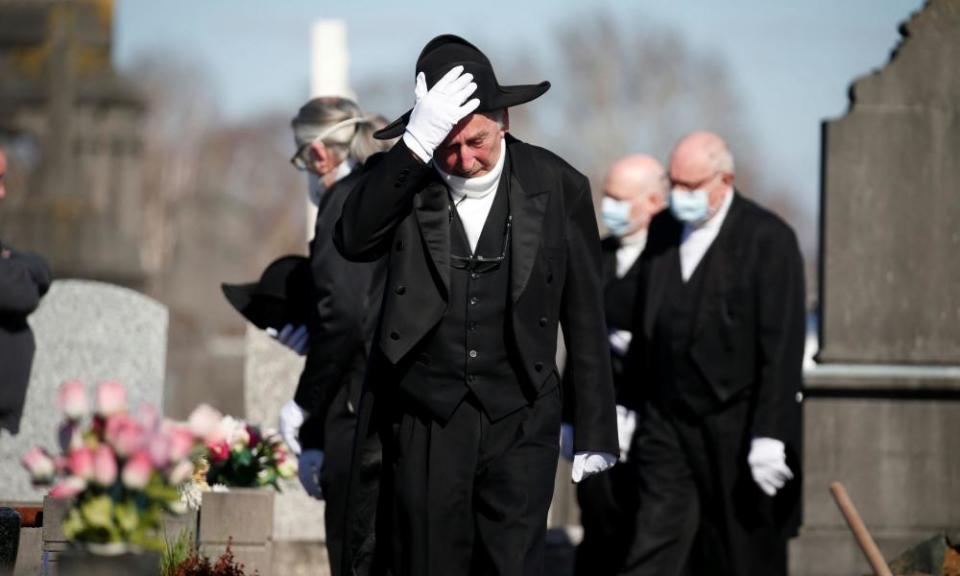The Charitables: French brotherhood burying dead since 1188

To the sound of a single tolling bell, the brothers of the Confrérie des Charitables de Saint-Éloi, in capes, white gloves and bicornes, lift the coffin from a wooden cart and lower it into the ground.
Standing over the grave they remove their hats, say “requiescat in pace” (rest in peace) in unison and bow their heads. It does not matter whether the deceased is rich or poor, the solemn ritual is the same and has been since 1188.
“We are all equal in death,” says the current chief brother, known as a “prévost”, Robert Guenot, 72, echoing the centuries-old precept of those known as “the Charitables” in the northern French town of Béthune.
“Our role is to be present to ensure the dead are given a correct, dignified burial, whoever they are. It is a role of paying respect to the deceased that the brotherhood has carried out for more than 830 years,” Guenot told the Guardian.

The Charitables trace their history back to 1188, when the north of France, along with much of Europe, was ravaged by plague and gravediggers found themselves overwhelmed by the number of corpses and fearful of being infected themselves.
Legend has it that two blacksmiths, Gauthier de Béthune and Germon de Beuvry, saw Saint-Éloi, also known as Saint Eligius, the patron saint of artisan iron and steel workers, in their dreams. The apparition ordered them to meet at a local spring and found a charity.
Since then, the Confrérie des Charitables de Saint-Éloi – whose motto is “accuracy, union, charity” – has carried out burials in the area.

Previously a religious organisation, the brotherhood was briefly banned during the French revolution and subsequently reinstated by Napoleon Bonaparte. The tricorne hats the brothers had worn until then were swapped for bicornes as a tribute to Bonaparte.
In 1853, the brotherhood became secular after a falling out with the bishop of Arras, who demanded it be overseen by the Catholic church or disband. Modern members are advised to avoid talking about about “religion and politics”, according to Guenot.
“We are a charitable organisation so what we do is done for free to anyone no matter their religion. We have buried Muslims, Jehovah’s Witnesses, evangelicals, Christians and atheists,” he said.
“We depend on donations from the public. Everyone knows us and many people in Béthune have relatives who have been brothers,” he added. “The brotherhood is not just based on respect, dignity and discretion with regard to the dead but on an idea of solidarity.”
Guenot said the brothers were also there for the living, collecting and distributing food for families in difficulty.

There are currently around 40 brothers, aged between 40 and 80 and drawn from all sectors of society, from “doctors, lawyers and insurance people to restaurant and factory workers”. Their numbers dropped below a dozen in the 1970s, but they continue to recruit and bury about 200 people a year.
The prévost is chosen from among the elders and holds the office for a period of two years. Guenot said it was his job to “hold the historical line we have had for centuries”. New members are proposed by a sponsor who must vouch for their “moral and mental” probity.
Outside each of Béthune’s cemeteries is a white circle where the Charitables gather after each burial. A designated brother calls out anyone who has broken the rules – for example not lifting their hat at the correct moment – and the miscreant is fined 50 centimes.
Today, the brothers are wearing masks to protect them against the coronavirus and maintaining the required 1-metre distance.
“It is a difficult situation at the moment, but we are confident that what is happening now will pass,” Guenot says. “As it has for centuries.”

 Yahoo News
Yahoo News 
